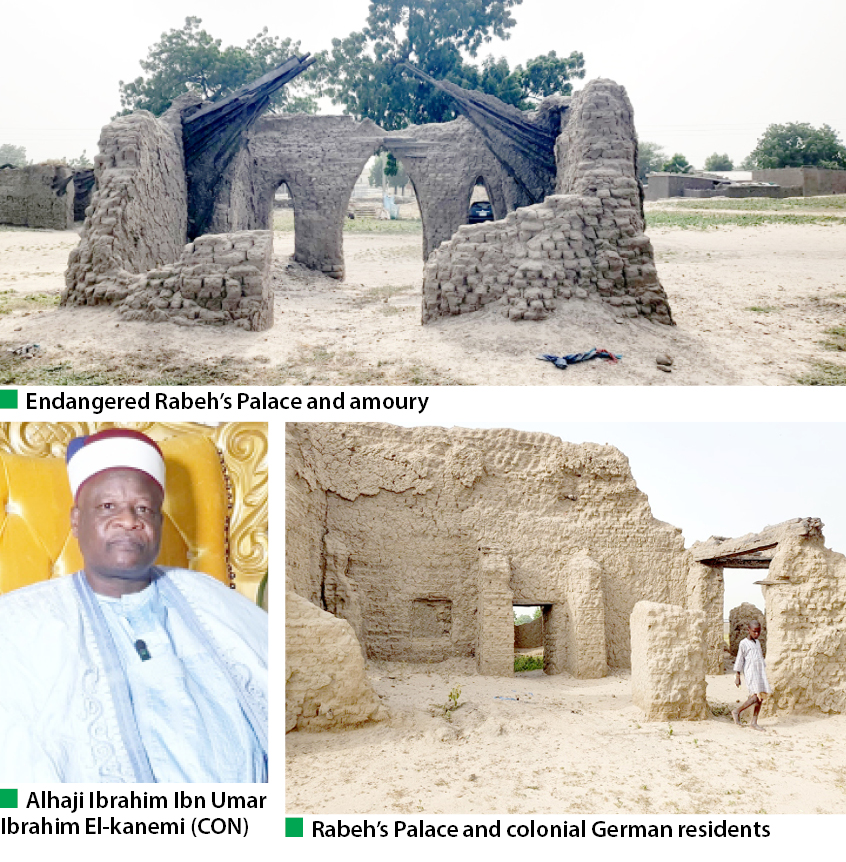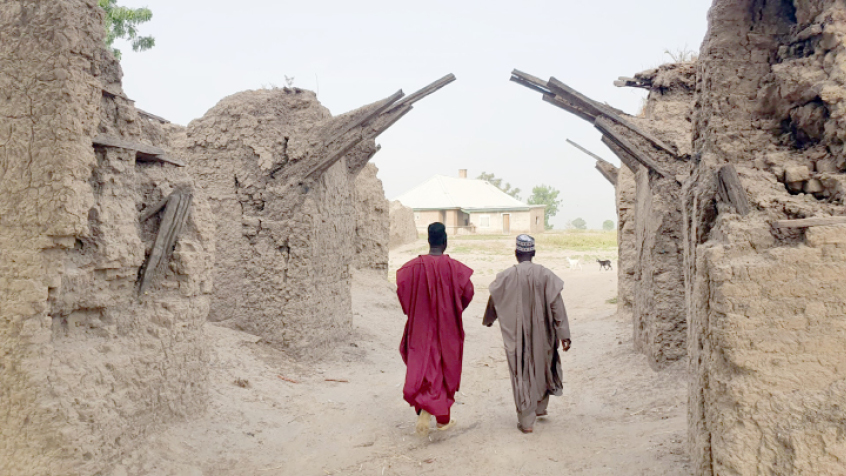The history of the Ancient Kanem-Borno Empire cannot be complete without a lavish mention of Rabeh and his famous Fort at Dikwa, in Dikwa Local Government Area of present-day Borno State. Daily Trust on Sunday visited the Forts and reports.
At the zenith of its power and influence in the medieval times, Kanem-Borno Empire covered parts of the Western Sudan and the most-expensive stretch of the Central Sudan.
It was administered from Kukawa town, and later to Dikwa at some points in the 18th and 19th centuries before the entity’s administrative headquarters was moved to present-day Maiduguri.
Our correspondent who visited Rabeh’s Forts recently observed that the lonely national monument site is in a pitiable state and now begging for attention.
The Kanem-Borno empire was more powerful and influential with a thousand years of golden era before it was interrupted by an infamous personality in its history, Rabeh.
Where is the federal government?
In Nigeria, students lack research, reading culture
Rabeh, the most-infamous warlord that invaders held in deep awe wherever his name is mentioned across the length and breadth of the empire, built his fort, on the outskirts of Dikwa, from where he ruled and radiated his personality across the empire.
Rabeh is no more, but the custodian of his history, his fort, lives on to always remind modernity and posterity of one of the most-famous warlords in the histories of the Western and Central Sudan.

Rabeh Forts, foremost tourism centre in Northeast
Inside the fort lies a secluded desert view of Rabeh’s kingdom, where the relics of his upstairs palace, armoury and aviary of his three mysterious birds that he sends on errand, were found in ruin.
“At the zenith of his power, everything about Rabeh was 999; Rabeh’s wives were 999, soldiers 999, horses 999, cows 999, sheep 999, but I’m not sure of the number of his children,” a tour guide revealed.
Also, the retired Ex-Executive Secretary Arts and Cultural Borno State, Chief Lanre Obadiah, noted that the fort is partly delipidated due to negligence from the custodians of history and culture, but severely destroyed by Boko Haram insurgents.
He said most of the fort’s vital historical artefacts and crafts work have been looted and carted away by the insurgents before setting it ablaze.
“The insurgency which had affected Borno in so many dimensions also impacted negatively on tourism potentials in the state.
“Of course, one of the foremost tourism centres Borno has is Rabeh Forts. Rabeh Forts before insurgency was a historical and cultural place that a lot of tourists visit.
“It is unfortunate that insurgency devastated the economy and peace of Borno. For a few years, everyone deserted Borno and it was a field day for Boko Haram. With time, they decimated everything worthy of note; historical items were taken away, part of the building was destroyed and so many things that would naturally attract scholars, tourists and visitors were taken away and destroyed.
“This left Rabeh Fort a ghost of itself.”
He added that despite the current state of the fort, it remains one the most-attractive historical and cultural destinations to visit in the North-East region because of its uniqueness and historical richness.
“But gradually, with the insurgency almost over, I am sure Rabeh Forts will bounce back, but there should be joint collaboration between the governments, tourism promoters, researchers and stakeholders to restore the site.
“It will continue to be a vibrant centre because we can’t do away with history. It is a centre of history and culture; it will also continue to be part of the story of Borno. Rabeh Forts is still very much relevant,” he said.
Boko Haram looted, burnt artifacts and craftworks
The Site Manager of Rabeh Forts, Mr Daniel Ishaya Manda, said Rabeh Forts is one of 60 internationally-recognised historical sites in Nigeria.
According to him, the Fort was declared as a national monument in 1959, a year before Nigeria gained independence. For over 120 years, it has been the only Fort in the entire region now known as North-Eastern Nigeria.
He explained that before the emergence of Boko Haram insurgency, Rabeh Forts was a delight for tourists and researchers.
Students and researchers from Nigerian and foreign universities, the Nigerian Defence Academy and foreign tourists visited the site to obtain firsthand information about Rabeh’s personality and history.
He said, “The whole Dikwa town was attacked and invaded by the insurgents, it forced everyone to leave and the entire town was deserted.
“The German colonial residence was occupied by one of the Amirs (Commander) and the Rabeh main palace was occupied by some commanders, but when they heard that the Chadian troops were coming, they looted all the artifact, art collection and pictorial exhibitions.
“I was attacked; they burnt everything that belonged to me, I lost everything in Dikwa after we left because there was no renovation and the palace dome collapsed.
“Unfortunately, I remember those days when students of the Nigerian Defence Academy Jaji used to visit Dikwa to look at the architectural design of the Forts. Also, undergraduate students and researchers as well as international tourists used to visit the Forts but now the Forts is not in its original state.
“The federal government is working on how to revive the site and restore it to its original state. I think with the current effort of the National Monuments, work will soon start because Dikwa is lively now.”
Renovation of Rabeh’s Forts will enhance revenue
A resident of Raberi, Mohammed Kimmie, said before the insurgency ravaged the town between 2014 and 2015, Rabeh’s dome palace was usually used by Islamic clerics as a school for teaching children around Raberi, a ward named after the warlord.
Another resident, Bakura Babagan, expressed the need for the government to rehabilitate and revitalize the Fort due to its economic value to the host community and the state at large.
It was also used as a traditional factory of sorts where women weaved local mats and men crafted local hoes and knives.
“There is neem shift, we called it museum market. In the evenings, you find people weaving local Zanna mats, and they used to display art craft, caps, hoes, knives, cutlases and many other items.
“So, the economic importance of Forts is much because it attracts visitors from all over the world as a result of colonial German residence there. Governments should look into this, as a matter of urgency, to renovate and construct our route from Maiduguri to Dikwa because without good road networks, tourists won’t be able to come here.”
Forts would create employment for our teeming youths
The Shehu of Dikwa, Alhaji Ibrahim Ibn Umar Ibrahim El-kanemi (CON), has reiterated that Dikwa town and its environs are safe for tourists, noting that the state government has worked hard to ensure that normally returned to the ancient town.
“Rabeh was an invader who ruled from 1893 to 1900. His seven years reign was horror before he was killed by German colonial rule in 1900. Rabeh’s Fort came into being in 1959 and when we were young, white people used to visit Dikwa. Indeed, Rabeh fort is an international historical site.
“We have witnessed deadly attacks in Dikwa and Borno; we are now picking the pieces of our life together. Allah has spared our lives and we are once again enjoying peace in Dikwa. Dikwa is safe for tourists and researchers.
“Governor Babagana Zulum has been an exceptional leader, he has demonstrated this several times and we are glad that Allah sent him to us. We are glad he returned displaced persons back to their ancestral homes and people could farm now.”
The traditional ruler assured that the rehabilitation and revitalization of the Rabeh Fort would create employment for the teeming youth, especially in the area of hospitality.
“Some weeks ago, we received a delegation who came to inform us that very soon the federal government would start renovations on the site. That is good news to us.
“We are looking forward to seeing visitors trooping in like those days. We believe that it would add value to the state government and Dikwa community.
“I am urging our sons and daughters to come and invest, especially in the hospitality and agrochemicals industries. This will address unemployment and provide job opportunities for our teeming youths across the state.”
He believes that with concerted effort by the government for the rehabilitation and revitalization of the Rabeh’s Fort to attract foreign tourists, it could become a viable source of revenue.

 Join Daily Trust WhatsApp Community For Quick Access To News and Happenings Around You.
Join Daily Trust WhatsApp Community For Quick Access To News and Happenings Around You.

